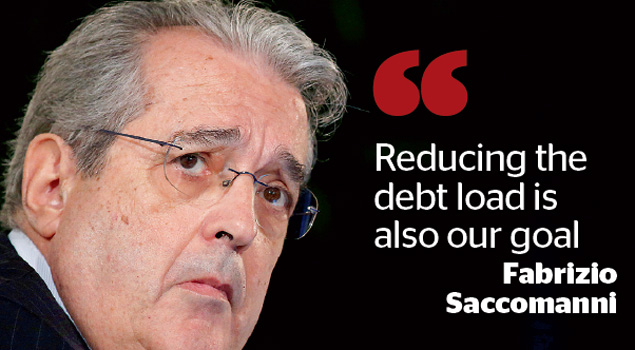
403
Sorry!!
Error! We're sorry, but the page you were looking for doesn't exist.
EU aims to reduce debts
(MENAFN- Khaleej Times) France, Italy and Spain sought to maximise the flexibility of European Union budget-deficit rules to boost their economies as northern euro-area countries saw little need for stimulus.
The growth-versus-austerity debate was renewed at a meeting of finance ministers in Brussels on Friday, as euro-area governments attempted to coordinate budget policy for 2014 using powers that were introduced earlier this year as part of their response to a debt crisis now in its fifth year. "No, no, no," Italian Finance Minister Fabrizio Saccomanni told reporters when asked whether his government would modify its budget. "Reducing the debt load is also our goal, and we managed that both with fiscal policies by reducing the shortfalls and with additional measures that they have now fully understood."
National budgets are under pressure after the eurozone's nascent economic recovery nearly ground to a halt in the third quarter. The 17-nation economy expanded 0.1 per cent, after 0.3 per cent growth in the second quarter, with unemployment at a record 12.2 per cent and inflation at its lowest level in four years. The European Central Bank is considering combating the torpor by pushing interest rates into negative territory for the first time.
Germany remains largely untouched by the slowdown, with figures on Friday showing business confidence surged to the highest level in more than 1 1/2 years.
That's the underlying reason why the Germans don't see any need for stimulus. At the same time, Chancellor Angela Merkel has signalled her intention to support a national minimum wage as a concession to the Social Democrats, the party she defeated in an election on September 22 and with which she is trying to form a coalition. The move would help spur domestic demand in Germany, which the EU and southern euro-area nations have said is needed to rebalance the bloc's economy by boosting exports from struggling countries. "It's important, even fundamental, to reduce deficits," French Finance Minister Pierre Moscovici said. "But we also have to give more muscle to growth in Europe." He called for "support for internal demand in countries with external surpluses."
With EU rules stipulating that countries must not have deficits of more than three per cent of gross domestic product and debt of no more than 60 per cent of GDP, governments have been under added scrutiny to show that their budgets for 2014 would keep them on track to meet those targets.
Saccomanni's remarks echoed those of Italian Prime Minister Enrico Letta. "On the European front, for some ayatollahs of rigor, this is never enough," Letta said in Rome. "But Europe will end up dying of too much rigor, our companies will end up dying."
Some Italian measures are works in progress that the commission has yet to rule on.

Legal Disclaimer:
MENAFN provides the
information “as is” without warranty of any kind. We do not accept
any responsibility or liability for the accuracy, content, images,
videos, licenses, completeness, legality, or reliability of the information
contained in this article. If you have any complaints or copyright
issues related to this article, kindly contact the provider above.

















Comments
No comment